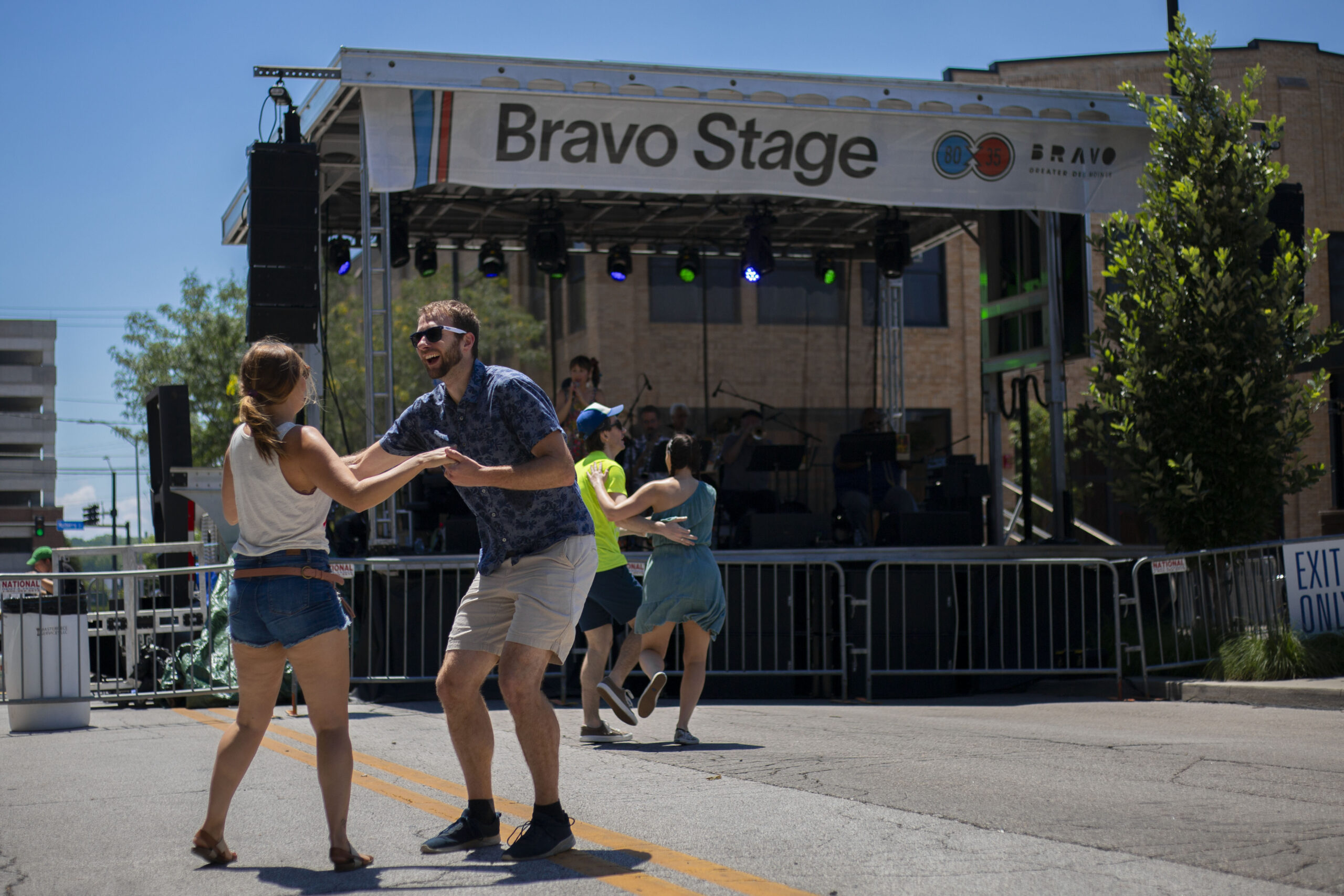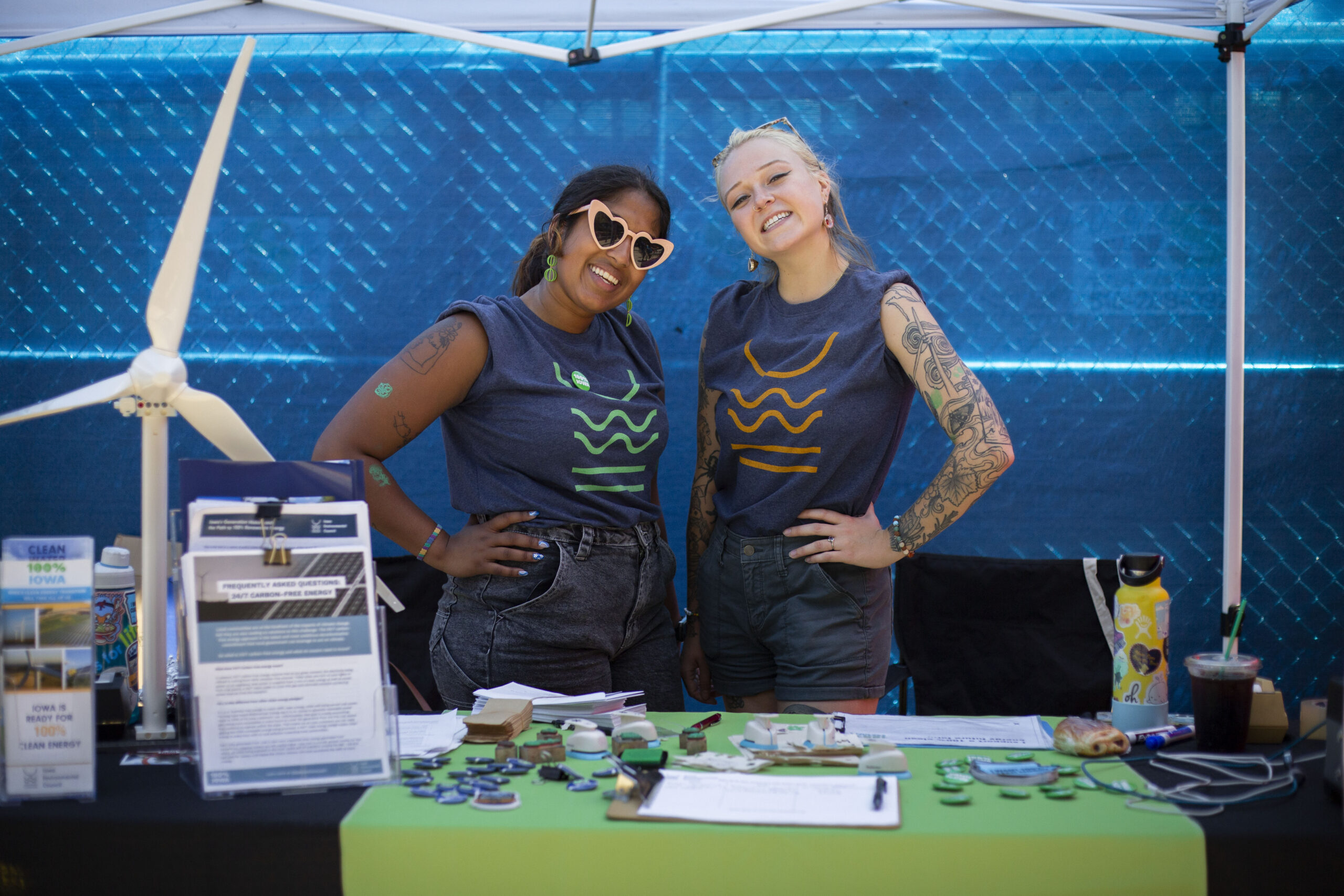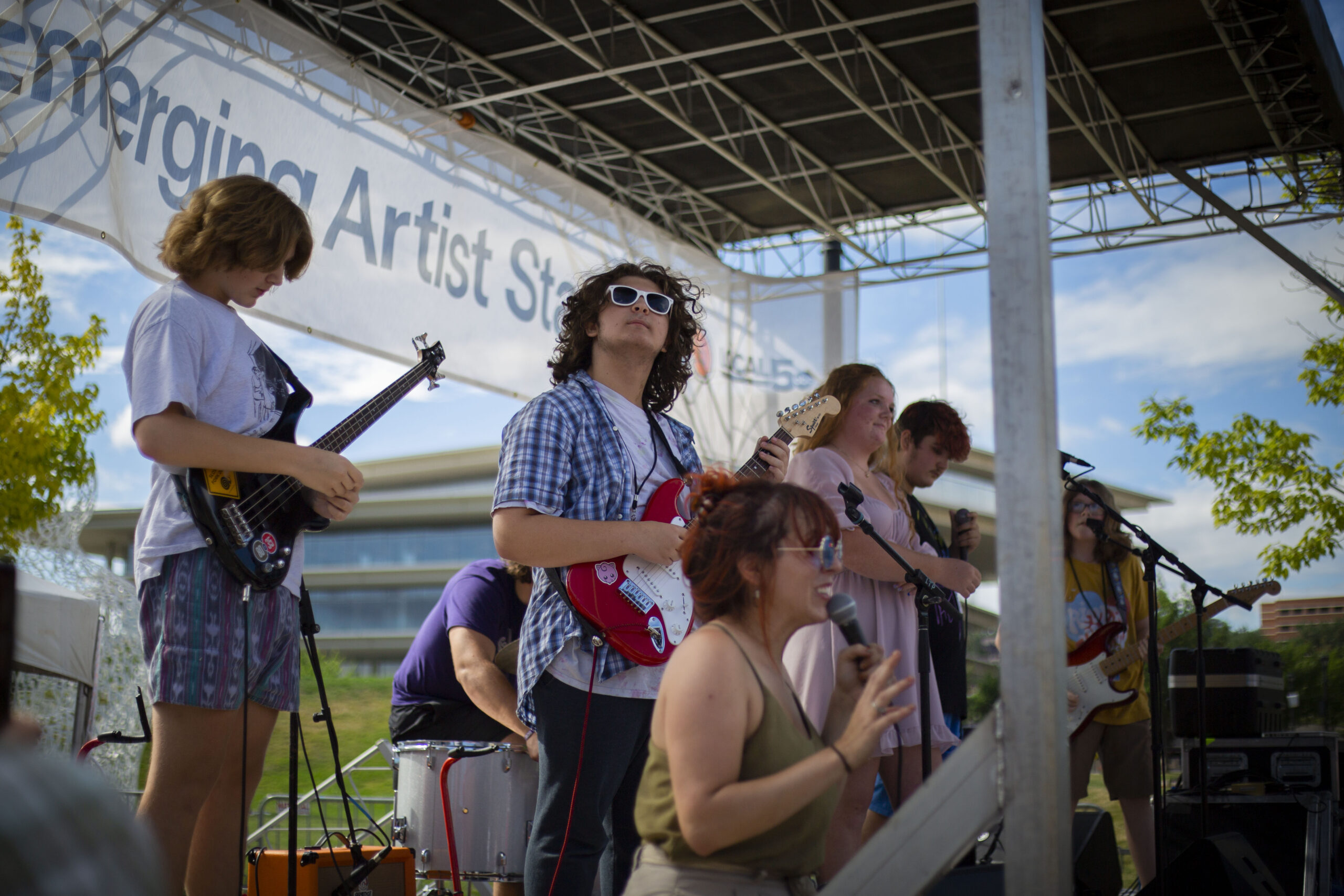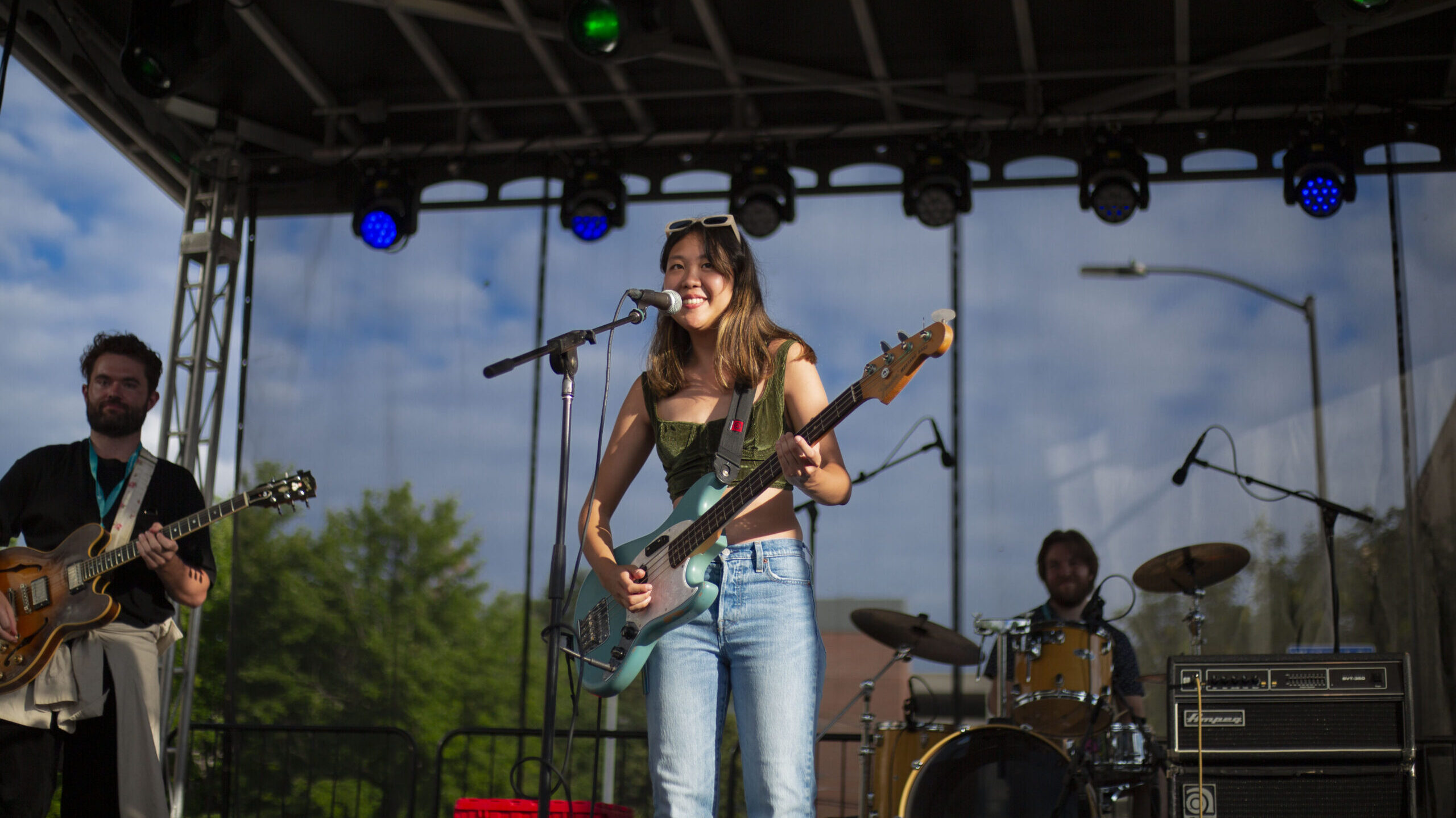80/35, aptly named for Des Moines’ location at the confluence of Interstates 80 and 35, is redefining the idea of what it means to be a music festival in the Midwest. Equal parts huge concert and neighborhood block party, 80/35 takes the idea of a community-centric model and runs with it. The festival features dozens of artists across one paid and four free stages over two days, and directly reinvests proceeds into the ecosystem of Des Moines’s music scene through the efforts of its presenting organization, the Des Moines Music Coalition.

Although 80/35 features nationally (and, for the first time this year, internationally) touring artists, the festival is first and foremost by and for the Des Moines and greater Iowa community—and you can tell. There are many things that set 80/35 apart from your average music festival, but the most immediately noticeable is the festival grounds themselves: the sprawl of stages spans multiple city blocks in the center of downtown Des Moines.
By stationing the festivities in the heart of the city, 80/35 embraces the idea of being a community-focused festival first. For every out-of-towner there for the festival (myself included), you’d see just as many local families taking an evening walk through the grounds after dinner or to get home. It’s experiences like this that I think we all took for granted, but are coming to appreciate more after living through several years where simply being able to gather with your community was a herculean task.
Victoria Park, festival artist“Everyone needs something to look forward to that they don’t need to drive to a bigger city to find.”
Just as 80/35 powers Des Moines music, the people of Des Moines power the festival. Aside from a handful of staff positions, the festival is nearly 100% run by volunteers. These hundreds of locals are the unsung heroes of the festival’s mission, doing everything from concert setup to merch sales, and they’re the reason the festival has been able to thrive for the past 15 years.
Attendees were also able to get a sampling of local organizations and nonprofits at 80/35’s Community Village, one of its numerous free areas open to the general public. Over a dozen booths represented a variety of causes, and the passion was overwhelmingly clear.
Activities ranged from botanical body art by the plant sellers at Art Terrarium to an original board game modeled on the neighboring sculpture park from local game shop The Rook Room (though my personal favorite was getting to play with a model wind turbine, thanks to the folks at the Iowa Environmental Council). Of course, not every organization stayed put at a booth, either—the Des Moines Breakerz, a local breakdancing school, also performed in the Community Village several times throughout the weekend. This opportunity for these organizations to come together with attendees is another great example of how 80/35 prioritized making space for the people and culture of Des Moines at the festival.

Beyond meeting the organizations represented in the Community Village, attendees could also visit a booth where they could learn about the work that the Des Moines Music Coalition does beyond organizing 80/35.
“We have 30,000 people come down to this festival,” DMMC Executive Director Mickey Davis remarks. “I would imagine that a small percentage of them, one, know that the festival is a nonprofit and two, know that the Des Moines Music Coalition is the nonprofit behind that festival.”
Though 80/35 is the DMMC’s flagship event, it’s far from the only thing the organization does; throughout the year, they program GDP, a local music festival with an all-Iowa lineup; Music University, a conference for music industry professionals; and several youth music education programs, all of which are centered around providing arts access and platforming to local talent.
Mickey Davis, DMMC Executive Director“I think there’s a great argument to be made for music as the soundtrack to a community.”
Festival artist Victoria Park, who makes music under the spoonerism Pictoria Vark, remarks, “I’m a big believer in the ‘local event.’ Everyone needs something to look forward to that they don’t need to drive to a bigger city to find.”
A big part of what makes arts in the Midwest so unique is the common philosophy of meeting ourselves where we are; this idea that there is creativity happening in our own communities that we don’t need to import from anywhere else. 80/35 really takes this value to heart in their mission and programming—this year, more than half of the festival’s lineup consisted of Iowan artists, with even more coming from the greater Midwest region as a whole. “A lot of outsiders who haven’t been out here tend to brush off ‘Iowa music’ as just white people playing country music,” says Park. “But that’s simply not the case, and there’s so much talent here to dispel that.”
This immense celebration of local talent was a particular goal of Davis’s in his first year as festival director. “If you can help connect the great musicians in your community with an audience that loves live music and may not know that it’s available in their backyard, to me, that’s a great role that you can play to really bring people together around the celebration of a music scene,” he says. Initiatives like 80/35’s Bravo and Emerging Artists Stages, which feature all-Iowa lineups and local acts under the age of 21, respectively, really drive home this goal.

80/35’s spotlight on local artists doesn’t just stop at the festival lineup itself—the festival press team also offers an Emerging Photographers Fellowship for aspiring music photographers, again under the age of 21. This is an extension of the DMMC’s year-round commitment to offering professional development opportunities for emerging industry professionals in Des Moines’s music scene, and something Davis is very passionate about.
“There’s some serious gatekeeping going on [in the music industry] in terms of who gets certain opportunities,” he says. “It’s so much easier to shoot your second music festival than it is your first, because every festival is looking for, ‘What experience do you have? What’s your portfolio?’ If we can be the proving grounds and help people get the experience that they need to go on and do it elsewhere, I’m all for that—and I think that idea is really central to 80/35.”
It’s easy to see the kind of impact an event and a culture like this has on a place like Des Moines. 80/35 not only brings in valuable tourism dollars for the city, but it provides a totally unique experience for locals to come together and celebrate the art that’s right next door. “I think there’s a great argument to be made for music as the soundtrack to a community,” says Davis. “I just think that will continue to be our calling card; that we are more affordable, more accessible, and embedded into the middle of a downtown.”
Ultimately, you could find bigger music festivals to go to, even in the Midwest—but there’s something special about 80/35. The unparalleled sense of community shines through in the festival’s ability to bring in the draw of big-name artists while still staying true to its Des Moines roots and celebrating the thing that makes its local arts and music so great—the people.
